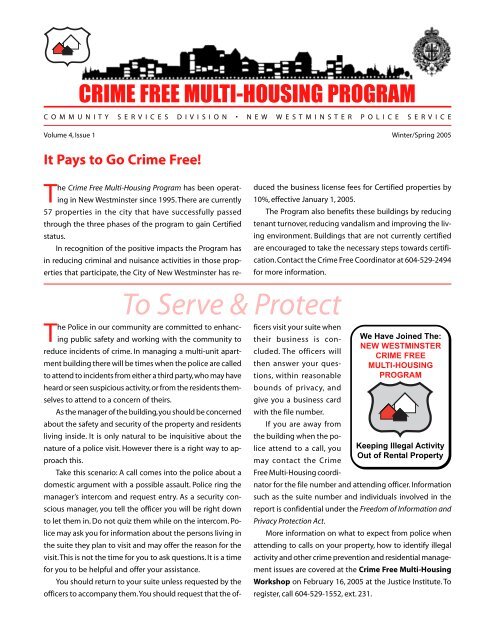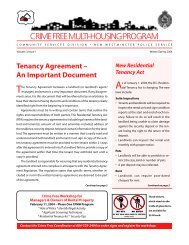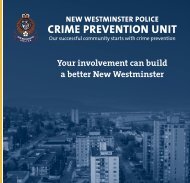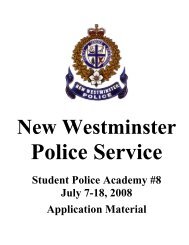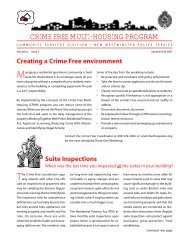Crime Free Multi-Housing Program - New Westminster Police
Crime Free Multi-Housing Program - New Westminster Police
Crime Free Multi-Housing Program - New Westminster Police
Create successful ePaper yourself
Turn your PDF publications into a flip-book with our unique Google optimized e-Paper software.
CRIME FREE MULTI-HOUSING PROGRAMC O M M U N I T Y S E R V I C E S D I V I S I O N • N E W W E S T M I N S T E R P O L I C E S E R V I C EVolume 4, Issue 1 Winter/Spring 2005It Pays to Go <strong>Crime</strong> <strong>Free</strong>!The <strong>Crime</strong> <strong>Free</strong> <strong>Multi</strong>-<strong>Housing</strong> <strong>Program</strong> has been operatingin <strong>New</strong> <strong>Westminster</strong> since 1995. There are currently57 properties in the city that have successfully passedthrough the three phases of the program to gain Certifiedstatus.In recognition of the positive impacts the <strong>Program</strong> hasin reducing criminal and nuisance activities in those propertiesthat participate, the City of <strong>New</strong> <strong>Westminster</strong> has reducedthe business license fees for Certified properties by10%, effective January 1, 2005.The <strong>Program</strong> also benefits these buildings by reducingtenant turnover, reducing vandalism and improving the livingenvironment. Buildings that are not currently certifiedare encouraged to take the necessary steps towards certification.Contact the <strong>Crime</strong> <strong>Free</strong> Coordinator at 604-529-2494for more information.To Serve & ProtectThe <strong>Police</strong> in our community are committed to enhancingpublic safety and working with the community toreduce incidents of crime. In managing a multi-unit apartmentbuilding there will be times when the police are calledto attend to incidents from either a third party, who may haveheard or seen suspicious activity, or from the residents themselvesto attend to a concern of theirs.As the manager of the building, you should be concernedabout the safety and security of the property and residentsliving inside. It is only natural to be inquisitive about thenature of a police visit. However there is a right way to approachthis.Take this scenario: A call comes into the police about adomestic argument with a possible assault. <strong>Police</strong> ring themanager’s intercom and request entry. As a security consciousmanager, you tell the officer you will be right downto let them in. Do not quiz them while on the intercom. <strong>Police</strong>may ask you for information about the persons living inthe suite they plan to visit and may offer the reason for thevisit. This is not the time for you to ask questions. It is a timefor you to be helpful and offer your assistance.You should return to your suite unless requested by theofficers to accompany them. You should request that the officersvisit your suite whentheir business is concluded.The officers willWe Have Joined The:NEW WESTMINSTERCRIME FREEthen answer your questions,within reasonable PROGRAMMULTI-HOUSINGbounds of privacy, andgive you a business cardwith the file number.If you are away fromthe building when the policeattend to a call, you Keeping Illegal ActivityOut of Rental Propertymay contact the <strong>Crime</strong><strong>Free</strong> <strong>Multi</strong>-<strong>Housing</strong> coordinatorfor the file number and attending officer. Informationsuch as the suite number and individuals involved in thereport is confidential under the <strong>Free</strong>dom of Information andPrivacy Protection Act.More information on what to expect from police whenattending to calls on your property, how to identify illegalactivity and other crime prevention and residential managementissues are covered at the <strong>Crime</strong> <strong>Free</strong> <strong>Multi</strong>-<strong>Housing</strong>Workshop on February 16, 2005 at the Justice Institute. Toregister, call 604-529-1552, ext. 231.
<strong>New</strong> <strong>Westminster</strong> <strong>Police</strong> –What is your Emergency?by Norvena MacFarlane, NWPS DispatcherAs residential managers, you will at some point in your career be callingthe police to assist you with incidents that arise from your buildings.Thankfully, many members of the <strong>Crime</strong> <strong>Free</strong> <strong>Multi</strong>-<strong>Housing</strong> havefollowed the advice of the program director Veronika Metchie, and participatein efforts to reduce crime in <strong>New</strong> <strong>Westminster</strong>. These incidentsvary from serious calls, such as domestic violence, assaults, or anythingin progress with a potential of injury or death, to minor calls such as bylawoffences, which include noise and parking issues.As professional public safety telecommunicators, it is our job to takeas much accurate information as possible from callers so that we canrender assistance to citizens in need. Help mitigate crisis situations, anddetermine what response is necessary to ensure the safety of the calleras well as the emergency personnel responding.Calls received are dispatched by priority. The more serious incidentsare responded to as quickly as members are available, while minor incidentsare queued.Telecommunicators must calmly break the caller’s hysteria thresholdand skillfully apply journalistic, investigative approach of asking who,what, where, when, why, and how, plus vital information about weapons.Their calm and professional handling of calls can save lives, and theirability to anticipate, and swiftly gather and relay information, preparesand protects the emergency responders who depend on them.Information that should be obtained on every call includes:• Exact nature of incident• Location of incident, location of caller• Building, floor, apartment number, nearest intersection or landmark• Telephone number caller is calling from• Whether or not anyone is in danger• Name of caller, call back number (full particulars including date ofbirth)• Description of vehicle, such as color, year, make, model, license, style,distinguishing marks, number of occupants• Description of persons, will include race, sex, age, height, weight, clothing,scars, identifying marks, etc.• Direction of travel.If all else fails in obtaining the information, we invoke the old dispatchadage for determining if a response is required.WHEN IN DOUBT, SEND THEM OUTDISPATCHERS SAVE SECONDS … SECONDS SAVE LIVES!Why Use a Credit Report?Managing a rental property can berisky business, particularly if you geta prospective tenant that is intent on committingillegal activity. The rise in identitytheft leaves many apartment managers vulnerablewho accept applicants based solelyon the information provided by the applicant.Many times friends or associates act asreferences for employment and previoustenancies.The best way to protect against beingscammed is requesting a Credit Report. Thisreport helps identify an individual by comparingthe name and personal informationon the application form to the informationon the credit report. The report will list currentand previous employers, as well ascredit accounts, outstanding balances, paypatterns, bankruptcies, liens, and collectionitems. The credit agencies, Equifax and TransUnion, will provide a score that evaluatesrisk based on credit history. They will alsoalert you if a fraud has been committed usingthis identity.Tenant Verification Services Inc. ( TVS)is a credit-reporting agency that serves theneeds of the residential rental industry byproviding fraud prevention tools that targetdelinquent tenants. TVS also checks applicationsagainst their “Delinquent TenantList” which identifies tenants with outstandingmonetary claims.TVS, a BBB member, also offers a discountedrate (nearly 25%) to properties thatare fully certified in the CFMH program. Thisis a must-have tool in your managementkit. Contact TVS at 604-576-3004 orwww.tenantverification.comfor more information.
ProtectYourMail &IdentityMail theft is at the forefront of concern for everyone: private citizens, businessowners and landlords alike. In most cases, the mailbox panels are easilypried open and the mail is stolen. The crown lock (Canada Post) is also oftenstolen, allowing the production of counterfeit keys. There are a number of waysto secure the panels, but the letter carriers will only use one key to open the panel.Once the mail has been delivered, it is no longer the property of Canada Post.Steps should be taken to ensure that your property is providing a safe receptaclefor delivery of the mail and remind residents to do the following:• Pick up mail as soon as possible after delivery.• When on vacation, have a trusted friend pick the mail up daily or use CanadaPost’s Hold Mail Service.• If you receive mail that is not yours, write “delivered to wrong address” or “notat this address” on the envelope and deposit in a Canada Post mailbox. Do notleave the mail unattended in the lobby.• Do not let strangers into the building.• Immediately notify the building manager or <strong>Police</strong> of any suspicious activityat the mailboxes.• Contact Canada Post at 1-800-267-1177 ifmailboxes are left open.Bell Locksmith has developed a lock that securesexisting mailboxes with steel carriage bolts,preventing the mailbox from being forced openwhile the crown lock is engaged. With a patentpending on the H-4600 lock, there have been noreports of theft or further break-ins once installed.Bell Locksmith also offers a 10% discount on installationof the locks to properties that are fully certifiedin the CFMH program. Contact Bell Locksmithfor more information at 604-467-4957 orwww.preventmailtheft.ca (a member of BBB).<strong>Housing</strong> Seniors: A Resource for Building ManagersDo you have seniors living in yourbuilding that are having difficultycoping? As people age, they experiencemany changes which may affect theirhealth, income, or social support network.Loss of friends and lack of mobilitymay make it harder to get out andmeet new people. All of these changesare important for a building managerto be aware of; as the manager may bethe only contact a senior has with theoutside world. The changes may alsonegatively affect their tenancy.The Seniors <strong>Housing</strong> Information<strong>Program</strong> (SHIP) provides information,including free workshops, on housingand related services to seniors. Locatedin <strong>New</strong> <strong>Westminster</strong>, they have produceda handbook on the types of issuesrenting seniors and managers faceincluding: Non-payment of Rent, Hoardingor Collecting, Refusing Assistance,Accidentally Setting Fires, and ConflictsWith Other Tenants. The book offers suggestionsand resource leads for themanager who may be facing a choiceof evicting a long-term tenant thatbecomes unmanageable because ofage. The booklet is available online athttp://www.seniorshousing.bc.ca/BuildingManagersBooklet.PDF or fromtheir office at Royal Square Mall, #209-800 McBride Blvd, ph. 604-520-6621.
<strong>New</strong> Privacy Act (PIPA)by Dean P. Davison LLB., M.B.A. C.F.E.Privacy is becoming a growing concernthroughout the world and asof January 1, 2004 is of paramount importancefor all businesses in BC. Thisarticle will provide a brief overview ofthe new British Columbia Privacy Actfor members of the <strong>Crime</strong> <strong>Free</strong> <strong>Multi</strong>-<strong>Housing</strong> <strong>Program</strong>. This is a generaloverview of the new privacy act andshould not be taken as legal advice. Allsituations are unique and it is my recommendationthat you seek specificlegal advice for each situation.As of January 1, 2004In January 2004, the BC Legislaturepassed into law the Protection of PersonalInformation Act (PIPA). Prior to2004 the privacy legislation in Canadawas mostly designed to control themanner in which City, Provincial, andFederal governments collect, hold anddisseminate personal information. PIPAnow encompasses all organizations inBC not included in other privacy acts.As an apartment owner or manageryou are now subject to the provisionsof PIPA and as such, you should knowwhat obligation PIPA places on you andhow to fulfill them.The purpose of the new privacy Actis to govern the collection, use and disclosureof personal information by privateorganizations. It also addresseshow you should protect someone’s informationwhen it is in your control. Inaddition, the Act outlines the mandatoryaccess a person has to their informationwhile it is in your control. Lastly,PIPA provides that you must have a privacypolicy accessible to the public ifrequested and a designated privacyofficer.Documents & Personal InformationAs PIPA regulates an organization’s useof “personal information documents”, itis essential to understand what is contemplatedby a “document” and “personalinformation” within the Act. Adocument includes anything on or bywhich information is stored in electronicor similar form, which essentiallyencompasses anything written downor recorded. It does not, however, applyto conversations or things not recorded.Personal information is defined inPIPA as information about an identifiableindividual. This means informationthat allows you to identify an individual.For example, a rental application,videotape or audiotape could fall underthe Act if you could identify an individualfrom looking at these documents.It is important to note that PIPAis concerned with collection, use anddisclosure, as such if you do not recordor collect the information; your actionsmay not be subject to the provisions ofthe Act.Next ColumnIn future columns I will review how tocomply with PIPA. I will explain the differentforms and types of consent youneed to function as an organization,important exceptions to the PIPA andthe fines involved with non-compliance.Lastly, we will review what happensif someone complains about yourpractices to the privacy commissionerand what you can do about it.It may appear that the PIPA was createdto make your life more difficult butcompared to other privacy legislationwithin Canada, it does a good job ofbalancing legitimate business interestswith reasonable privacy requirements.Dean P. Davison, MBA, LLB, CFE is articling atWatson Geopel Maledy, a full service law firm,located in Vancouver. He can be contacted atddavison@wgmlaw.com or 604-609-3097. Prior tolaw school he worked in the private sector inoperations for a Fortune 500 company. He has recentlybecome a certified fraud examiner and hiscurrent focus is in privacy and employment law.Dean has given numerous seminars and beenpublished in the area of privacy law.The <strong>Crime</strong> <strong>Free</strong> <strong>Multi</strong>-<strong>Housing</strong><strong>Program</strong> is designed to help owners,managers, and residents of multi-unitrental property work with the policeand other agencies to keep illegal andnuisance activity off such property.The result of this team effort is a safer,more habitable environment in whichto live.The program consists of three phases:Phase One: Residential Managersattend an 8-hour workshopPhase Two: Meet minimum requirementsfrom a Security AssessmentPhase Three: Management hosts anannual Resident Safety Social.Following completion of all threephases, the management will earnthe privilege of posting signs onthe property and using the CFMH<strong>Program</strong> logo in advertising.For more information, contact:Veronika MetchieCFMH <strong>Program</strong> Coordinator<strong>New</strong> <strong>Westminster</strong> <strong>Police</strong> ServiceTel: 604-529-2494vmetchie@nwpolice.orgThis newsletter is published by:<strong>New</strong> <strong>Westminster</strong> <strong>Police</strong> Service555 Columbia Street<strong>New</strong> <strong>Westminster</strong>, BC V3L 1B2Tel: 604-525-5411www.nwpolice.org


